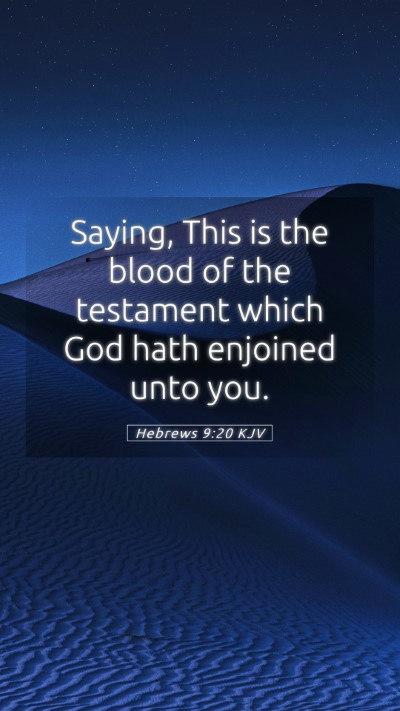Understanding Hebrews 9:20 - A Comprehensive Bible Verse Commentary
In this section, we will explore Hebrews 9:20 by providing a detailed commentary that combines insights from various public domain sources, including Matthew Henry, Albert Barnes, and Adam Clarke. This will provide a rich understanding of the Bible verse, making it easier for readers to grasp its meanings and implications.
Verse Text
Hebrews 9:20 (KJV): "Saying, This is the blood of the testament which God hath enjoined unto you."
Verse Explanation
This verse occurs in the context of discussing the sacrificial system established in the Old Testament. The Apostle Paul emphasizes the significance of the blood as a vital component of the covenant between God and His people.
Key Insights from Commentaries
- Matthew Henry: Henry notes that this passage speaks to the essentiality of blood in establishing covenants. The phrase indicates that sacrifices are not merely ritualistic but are filled with divine significance.
- Albert Barnes: Barnes explains that the blood represents the life that is offered unto God. The testament refers to God's agreement and promise to His people, which is underscored by the sacrificial death that solidifies this covenant.
- Adam Clarke: Clarke emphasizes that the particular mention of blood signifies purification and redemption. It holds the Old Covenant up against the new one established through Christ’s sacrifice, further illuminating the verse's outcome regarding grace and mercy.
Historical Context
Hebrews was authored to a group of Jewish Christians facing persecution and temptation to revert to their old ways. The writer aims to strengthen their faith in Christ's ultimate sacrifice, thus elaborating on the contrasts between the Old and New Testaments.
Understanding the Term "Blood of the Testament"
The term "blood" relates deeply to sacrificial practices in the Old Testament, where blood signifies life and the means of atonement for sin. God instituted these practices to foreshadow the coming of Jesus Christ, who would offer His life as the final atonement.
Significance of the Verse
This verse reiterates that the establishment of a covenant requires a sense of sacrifice and bloodshed. For believers, it encapsulates how the blood of Christ provides forgiveness and reconciliation with God, fulfilling the requirement set by the Old Testament law.
Application in Daily Life
Understanding Hebrews 9:20 can significantly impact one's spiritual journey:
- Gratitude: Recognizing the price paid for your sins fosters a deep sense of appreciation and gratitude towards God.
- Commitment: This verse invites believers to adhere to their covenant with God, emphasizing faithfulness and obedience in their walk.
- Witness: The revelation of Christ's sacrifice provides a powerful testimony that believers can share with others regarding God's love and grace.
Cross-References
Further enlightenment can be found by considering these related passages:
- Exodus 24:8: "And Moses took the blood, and sprinkled it on the people, and said, Behold the blood of the covenant, which the Lord hath made with you concerning all these words."
- Matthew 26:28: "For this is my blood of the new testament, which is shed for many for the remission of sins."
- 1 Peter 1:18-19: "Forasmuch as ye know that ye were not redeemed with corruptible things, as silver and gold, from your vain conversation received by tradition from your fathers; But with the precious blood of Christ, as of a lamb without blemish and without spot."
Conclusion
Hebrews 9:20 holds profound theological implications that bridge the Old and New Testaments, illustrating the permanence and significance of God’s covenant with humanity through the blood of Christ. For those seeking bible verse meanings, interpretations, or understanding, this verse serves as a powerful reminder of the depth of God's love and the grace offered through Christ’s sacrifice.
Engaging with this passage can enhance your bible study insights and deepen your biblical exegesis in understanding the complexity of God’s redemptive plan.


